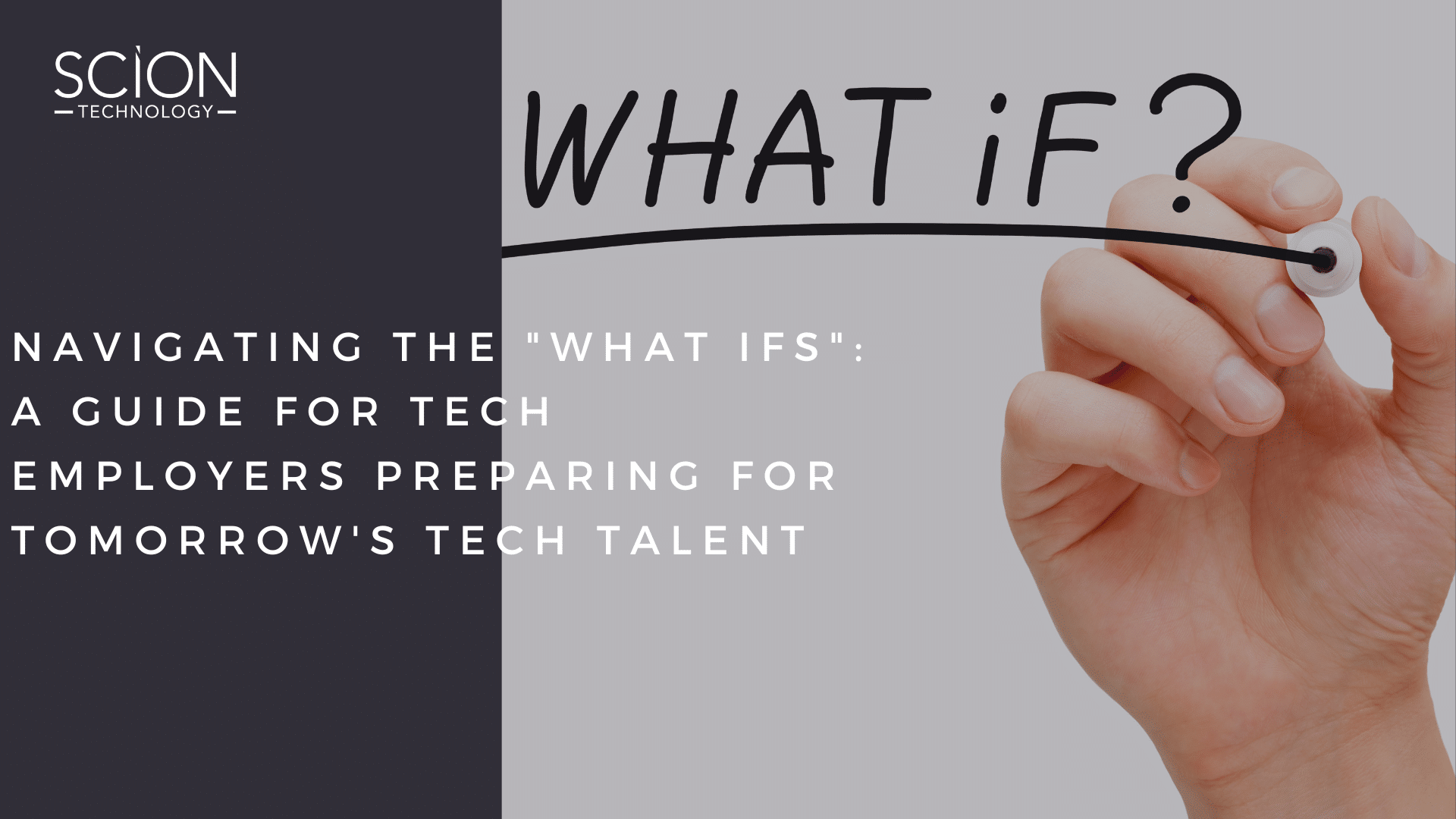
18 Apr Navigating the “What Ifs”: A Guide for Tech Employers Preparing for Tomorrow’s Tech Talent
The technology sector presents a dynamic and ever-changing landscape for employers, and they are often faced with a multitude of “What If” scenarios. In this competitive environment, talent acquisition and retention strategies are critical for success. This comprehensive guide explores the key considerations and strategic approaches that tech employers should utilize for hiring and retaining top talent. We’ll provide insights into the evolving tech job market, industry trends, and practical guidance to navigate the future with confidence.
Preparing for the “What Ifs” in Tech Talent Acquisition
The tech industry thrives on a constant churn of innovation, pushing the boundaries of what’s possible and doing everything possible to create a better experience for the people they serve. While this dynamism is a source of excitement and progress, it also presents a unique challenge for talent acquisition. Unlike more static fields, the “what ifs” of technological leaps and economic shifts can significantly alter the skillsets in high demand within the tech workforce.
Imagine a scenario where advancements in artificial intelligence drastically redefine the software developer landscape. Suddenly, the emphasis might shift from traditional coding expertise to a focus on AI integration and machine learning. Let’s dive into some of the biggest “what if” scenarios for tech employers and how to navigate these decisions.
“What If” the Demand for Tech Talent Surpasses Supply?
What if the demand for highly skilled tech professionals continues to outpace the available workforce? This scenario could significantly hinder your ability to innovate, compete, and achieve your business goals.
Understanding the tech talent market landscape is the first step. In-depth market research and labor reports can provide valuable data on skill gaps, salary trends, and emerging tech hubs. This allows you to strategically target your recruitment efforts and offer competitive compensation packages. Partnering with industry analysts and educational institutions can further equip you with insights into future job growth areas and the specific skillsets that will be in high demand.
Building strong relationships with universities, colleges, coding bootcamps, and specialized recruitment agencies like Scion Technology allows you to connect with early-career talent and influence curriculum development to ensure these programs align with the latest industry needs. Investing in internship and apprenticeship programs provides a win-win situation in our increasingly digital world. You gain valuable insights into potential hires’ skills and work ethic, while showcasing your commitment to fostering talent and creating a positive work environment.
“What If” Remote Work Continues to Dominate the Tech Sector?
The widespread adoption of remote work has fundamentally changed the landscape of the tech industry. To thrive in this new reality, organizations must make a key decision to embrace a remote-first infrastructure. This includes investing in secure and collaborative technology tools that facilitate seamless communication and project management across geographically dispersed teams. Establishing robust remote work policies that address everything from cybersecurity protocols to performance expectations is also crucial.
Embracing remote work unlocks the potential of a global talent pool for companies. This allows them to expand their search beyond local limitations and target highly skilled professionals regardless of their location. However, navigating visa regulations and the legalities of remote employment across different countries requires careful planning. Partnering with relocation specialists can be beneficial in this process. Despite these considerations, the benefits of accessing a broader range of talent far outweigh the challenges.
“What If” AI and Automation Reshape Tech Jobs?
The constant march of AI and automation presents both challenges and opportunities for the tech industry. Staying ahead of the curve is paramount. Closely monitoring advancements in AI, particularly those impacting your specific tech sector, allows you to anticipate potential disruptions and adapt your strategies accordingly. Partnering with tech innovators can further accelerate this process, potentially leading to the development of in-house AI solutions that streamline workflows and enhance your competitive edge.
However, AI and automation won’t replace the human element entirely. The need for tech professionals with expertise in AI and automation will undoubtedly rise as the technologies continue to evolve. When crafting your hiring strategies, prioritize candidates who possess these skills alongside a strong foundation in traditional tech disciplines. But don’t overlook the importance of soft skills like critical thinking, problem-solving, and adaptability. These human qualities will be essential for navigating the tech landscape and ensuring your workforce can thrive alongside AI advancements, while still making human decisions in key aspects.
“What If” Cybersecurity Threats Intensify?
As our reliance on technology deepens, so do cybersecurity threats. To fortify your defenses, prioritize cyber resilience. This starts with comprehensive cybersecurity training for all employees, regardless of their role. Educating your workforce on best practices for data protection and identifying phishing attempts is a critical first step.
When building your tech team, prioritize candidates with demonstrable cybersecurity experience. Look for individuals who understand the latest cyber threats and possess the skills to mitigate them.
Beyond building a skilled team, a well-defined crisis response plan is essential. This plan should outline protocols for responding to potential security breaches, including data recovery and communication strategies. Regularly updating and testing your response plan ensures your team is prepared to react swiftly and effectively in the face of a cyberattack.
“What If” Tech Employers Need to Foster Diversity and Inclusion More Proactively?
The tech industry has a responsibility to cultivate a truly diverse and inclusive workforce. Start by fostering an environment of inclusion. This goes beyond simply hiring a wider range of candidates. Implement diversity initiatives like unconscious bias training to ensure a fair and equitable hiring process. Setting clear diversity, equity, and inclusion goals keeps you accountable and demonstrates your commitment to building a representative workforce.
Broadening your recruitment efforts is also crucial. Partner with staffing and recruiting agencies that prioritize Diversity, Equity, and Inclusion (DEI) in their practices. Consider implementing blind recruitment processes, which remove identifying information from resumes during the initial screening stage, to mitigate unconscious bias. By taking these steps, you’ll ensure your talent pool reflects the rich diversity of the tech landscape and unlock the potential of a broader range of qualified candidates.
“What If” Employee Expectations Shift?
The landscape of employee expectations is constantly evolving. To stay competitive in attracting and retaining top talent, you need to adapt. One key area is offering competitive benefits and flexibility. This might involve re-evaluating compensation packages to ensure they remain attractive in the current market. Additionally, consider offering perks that cater to work-life balance, such as generous parental leave policies or flexible work arrangements.
Investing in your employees’ career development is another crucial strategy. Providing clear career paths and personalized development plans demonstrates your commitment to their long-term growth within the company. Encouraging mentorship programs and fostering a culture of continuous learning empowers your workforce and keeps them engaged. By prioritizing these aspects, you’ll position your company as an employer of choice, even if employee expectations shift in the future.
Scion Technology: Your Partner in Building a Future-Proof Tech Workforce
The tech landscape can present a multitude of uncertainties or “what ifs” for organizations. At Scion Technology, we understand these challenges and are here to help companies find qualified tech talent on a daily basis. By offering a comprehensive suite of services designed to streamline talent acquisition strategies as well as empower teams to find long-term recruiting success.
Connect with us today to learn more about how a partnership with Scion can develop proactive strategies to address potential skill gaps and attract top talent, regardless of market fluctuations. We look forward to partnering with you and supporting your continued growth in the exciting world of technology.
About the Author
Patrick Chiotti (he/him) is an accomplished SEO writer and is currently the Marketing and Communications Specialist at Scion Staffing, bringing years of experience in SEO knowledge and a passion for writing to the Scion team. With additional experience in customer service roles, retail, and accounting, Patrick brings a unique set of knowledge and skills to his role while sharing the passion to continue learning about a wide range of topics so he can share his voice to a larger audience. Outside of Scion, Patrick spends his time as a football coach at the high school level and is passionate about teaching the game, while remaining a student to it. He is also a husband and father, and enjoys fitness, as well as a passion for cooking amazing food.


